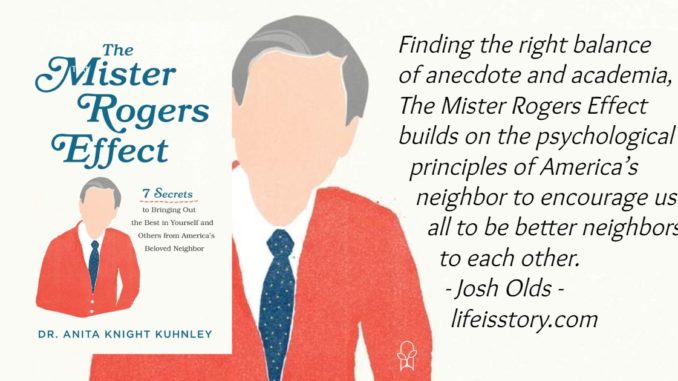
Published by Baker Books on September 1, 2020
Genres: Non-Fiction, Christian Life, Leadership
Buy on Amazon
Goodreads

In a world increasingly divided by politics and social issues, we need Mister Rogers more than ever. For three decades, his presence was a healing balm to children of all ages. And though he is no longer with us, we can all adopt his attitudes and actions as models for our own lives.
In this uplifting and informative book, Dr. Anita Knight Kuhnley shows us how to use the transformative psychological principles that Mister Rogers masterfully employed to make a difference in our own neighborhoods. Principles such as
- listening for discovery- validating feelings- preserving white space- expressing gratitude- exercising empathy- practicing radical acceptance- using expressions of care
Imagine a world where these seven principles guide our interactions with each other. Sound heavenly? Neighborly? It all starts with you.
Mister Rogers died on February 27, 2003. His life’s work—Mister Rogers’ Neighborhood—debuted in 1968 and had its last show in 2001, both pivotal years in American history. His effect on generations of kids, now adults, is seen everywhere and his influence has not even faded in death. A full eighteen years after his death, we’re still talking about him. Tom Hanks starred as Mr. Rogers in A Beautiful Day in the Neighborhood in 2019. A year before that, in 2018, Rogers was the subject of the award-winning documentary Won’t You Be My Neighbor? We keep coming back the man and his message years after his death. Anita Knight Kuhnley’s The Mister Rogers Effect is another in a long line of works that attempt to understand Fred Rogers’ philosophy because, more than ever, the world needs him.
Dr. Kuhnley is a professional counselor and professor of counseling at Regent University. While other books have served as memoir or biography or sought to understand Rogers’ influence on culture, Kuhnley’s goal is to distill the wisdom of Fred Rogers into some broad categories that we can use in our everyday lives. All of us—most of us—want to be more like Mr. Rogers but where do we even begin? Kuhnley divides the book into seven topics:
- Listening First.
- Validating Feelings.
- Pausing and Thinking.
- Showing Gratitude.
- Developing Empathy.
- Practicing Acceptance.
- Establishing Security.
Along the way, Kuhnley hits the highlights of Rogers’ career: his insistence on standing up to segregation and promoting racial justice, his interaction with Jeff Erlanger and work as a disability advocate, his speech before the US Senate when they wanted to cancel PBS funding. It’s been twenty years since the last episode of Mister Rogers’ Neighborhood, and that means that Kuhnley is forced to work with a lot of secondary sources. Her insights, while not entirely unique, are presented and collated very well. Her anecdotes are the Best Hits of Rogers’ career and doesn’t offer much in the way of new information. The Mister Rogers Effect isn’t a in-depth look at Fred Rogers’ career, but a careful and thoughtful series of essays on Rogers’ influence and how he modeled grace, humility, and care.
Kuhnley provides context for Rogers’ implementation of counseling practices and psychological principles, drawing on her own professional expertise to point out that Fred wasn’t just making stuff up. While he never presented it as academic, there was a definite system behind his person—who he was was a choice he made.
The Mister Rogers Effect compiles the person and persona of Fred Rogers into an easily-accessible format and gives readers a blueprint for behaving the way Mr. Rogers behaved. How did Mister Rogers become Mister Rogers? This book has the answer. Finding the right balance of anecdote and academia, The Mister Rogers Effect builds on the psychological principles of America’s neighbor to encourage us all to be better neighbors to each other.
